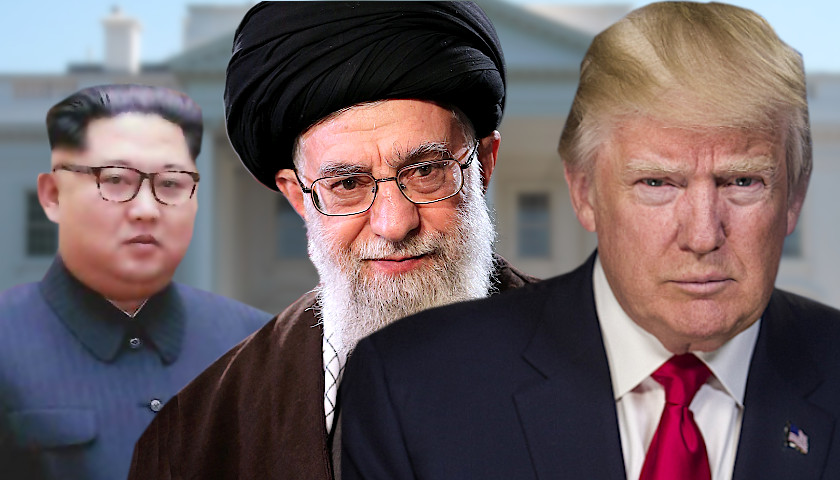U.S. President Donald Trump assailed his intelligence chiefs Wednesday, calling them “extremely passive and naive when it comes to the dangers of Iran. They are wrong!”
He added, “Perhaps Intelligence should go back to school!”
Trump’s unusual broadside on Twitter against the heads of the country’s intelligence agencies came a day after they disputed some of his views on Iran and world trouble spots in testimony before a congressional hearing on global threats.
Central Intelligence Agency Director Gina Haspel said Iran was “technically” in compliance with the 2015 deal between it and world powers to curtail its nuclear weapons development and at least a year away from developing such a weapon.
Trump tweeted that since the U.S. withdrew from the pact, Iran is “MUCH different, but a source of potential danger and conflict.They are testing Rockets (last week) and more, and are coming very close to the edge. There economy is now crashing, which is the only thing holding them back. Be careful of Iran.”
The Intelligence people seem to be extremely passive and naive when it comes to the dangers of Iran. They are wrong! When I became President Iran was making trouble all over the Middle East, and beyond. Since ending the terrible Iran Nuclear Deal, they are MUCH different, but….
— Donald J. Trump (@realDonaldTrump) January 30, 2019
….a source of potential danger and conflict. They are testing Rockets (last week) and more, and are coming very close to the edge. There economy is now crashing, which is the only thing holding them back. Be careful of Iran. Perhaps Intelligence should go back to school!
— Donald J. Trump (@realDonaldTrump) January 30, 2019
Director of National Intelligence Dan Coats said the U.S. faces a “toxic mix” from the “big four” adversaries – Russia, China, North Korea and Iran.
Trump offered a more nuanced but upbeat view of global threats, even as he retreated from previous boasts that the U.S had defeated the Islamic State terrorist group and that North Korea was no longer a nuclear threat.
Trump said that when he became president two years ago, Islamic State “was out of control in Syria & running rampant. Since then tremendous progress made, especially over last 5 weeks. Caliphate will soon be destroyed, unthinkable two years ago.”
In mid-December, however, as he announced he was withdrawing the 2,000 U.S. troops stationed in Syria, Trump declared, “We have won against ISIS,” an acronym for Islamic State. “We have beaten them and we have beaten them badly.”
Similarly, he stepped back from his assessment last June after his Singapore summit with North Korean leader Kim Jong Un, when he said, “There is no longer a Nuclear Threat from North Korea.” He said then that Americans and the rest of the world can “sleep well tonight!”
Instead, Trump, who is planning a second summit with Kim in late February, said there is a “decent chance of denuclearization.”
The U.S. leader said the “North Korea relationship is best it has ever been with U.S.,” with no North Korean missile and nuclear testing for months, the return of the remains of American soldiers killed in the Korean War seven decades ago and the freeing of several Americans held by Pyongyang.
…Time will tell what will happen with North Korea, but at the end of the previous administration, relationship was horrendous and very bad things were about to happen. Now a whole different story. I look forward to seeing Kim Jong Un shortly. Progress being made-big difference!
— Donald J. Trump (@realDonaldTrump) January 30, 2019
“Time will tell what will happen with North Korea, but at the end of the previous administration, relationship was horrendous and very bad things were about to happen,” Trump said. “Now a whole different story. I look forward to seeing Kim Jong Un shortly. Progress being made-big difference!”
Trump also cautiously suggested the end of the 18-year U.S. military involvement in Afghanistan that was started in response to al-Qaida’s Sept. 11, 2001, terrorist attacks on the U.S. that killed nearly 3,000 people.
He said negotiations between the U.S. and Taliban fighters “are proceeding well in Afghanistan after 18 years of fighting. Fighting continues but the people of Afghanistan want peace in this never-ending war. We will soon see if talks will be successful?”
Coats told the Senate Intelligence Committee, “It is increasingly a challenge to prioritize which threats are of greatest importance.” His testimony often contradicted Trump’s past assertions.
He expressed skepticism that North Korea will ever give up its entire nuclear arsenal, pointing to “activity that is inconsistent with full denuclearization.”
CIA chief Haspel said that despite indications North Korean leader Kim Jong Un “is trying to navigate a path toward some kind of better future,” his calculations on the need for nuclear weapons do not seem to have changed.
“The regime is committed to developing a long-range nuclear-armed missile that would pose a direct threat to the United States,” she told lawmakers.
Coats said the IS caliphate in northern Syria and Iraq has been reduced to just a “couple of little villages” in Syria. But he said underestimating the group’s resolve would be a mistake.
“ISIS is intent on resurging and still commands thousands of fighters in Iraq and Syria,” Coats said.
“ISIS will continue to be a threat to the United States, and we’re going to have to continue… to keep our eyes on that and our interest in the realization that this terrorism threat is going to continue for some time.”
– – –
Photo “Ayatollah Khamenei” by Khamenei.ir. CC BY 4.0.
Background Photo “White House” by AgnosticPreachersKid. CC BY-SA 3.0.





